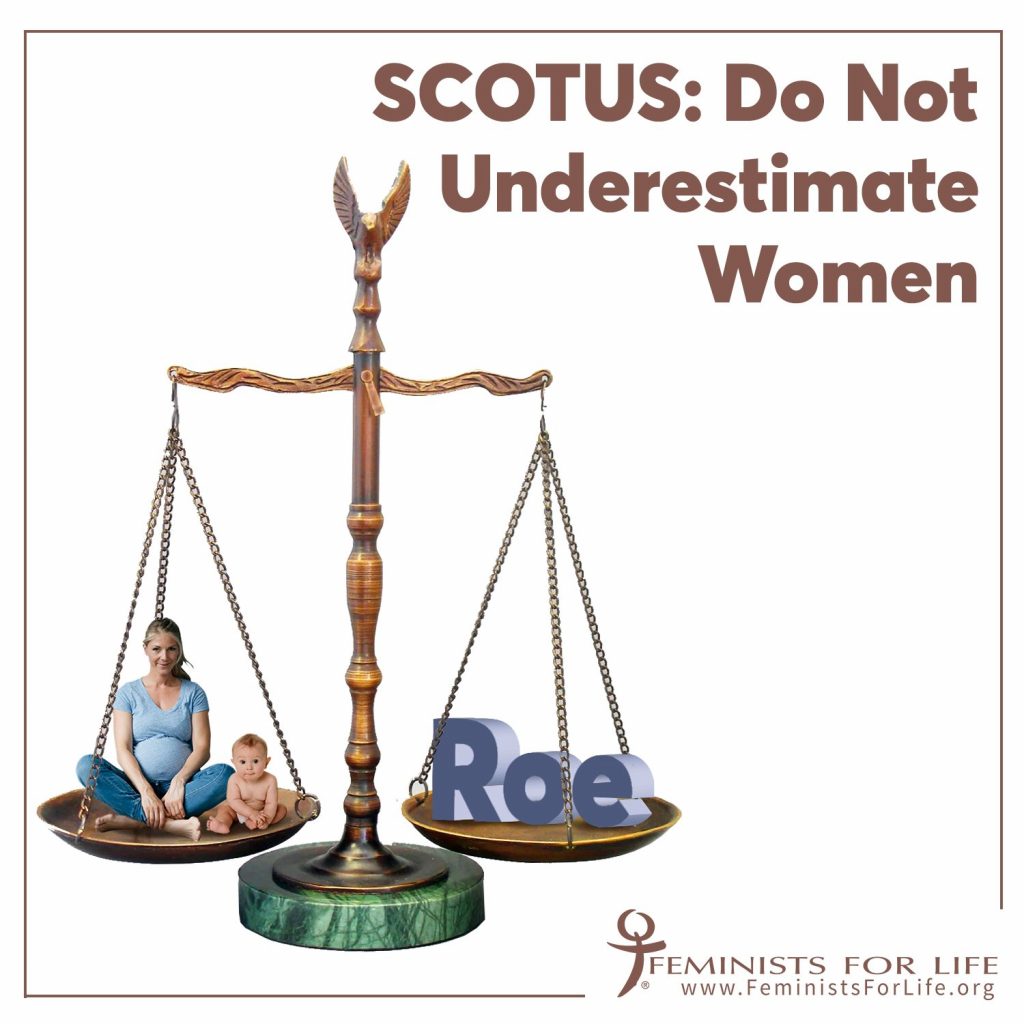Editor’s Note: One week in advance of Women’s Equality Day, the 101st anniversary of the adoption of the 19th Amendment — as well as a key Supreme Court case that has the potential to overturn Roe — we are excited to announce FFL President Serrin M. Foster’s latest op-ed in the Washington Examiner, “Don’t Underestimate Women.”
Don’t Underestimate Women
This fall, the U.S. Supreme Court will take up one of the most important cases since Planned Parenthood S.E. Penn v. Casey (Casey) challenged Roe v. Wade (Roe) but ultimately left the core “right” to abortion in place.
In Dobbs v. Jackson Women’s Health Organization (Dobbs), abortion advocates will challenge Mississippi’s new law restricting abortions to 15 weeks. Many filing amici briefs on the pro-life side will rightfully focus on the undeniable humanity of the unborn child seen through ever more clear sonograms throughout a human being’s remarkable development. Others will argue about the state’s right to restrict abortion based on the age they determine. Many will focus on viability. It is a real possibility that the U.S. Supreme Court will return abortion laws back to the states. In effect, Roe could be overturned.
But there is another important issue that cannot be ignored.
It started in 1971 when a young attorney named Sarah Weddington argued before the court that pregnant students, working women, and poor women needed access to abortion, rather than to challenge universities, employers, and society to address the unmet needs of mothers and their children.
This anti-feminist sentiment was echoed in 1992 when the court determined in Casey that women were basically incompetent, telling women that they cannot succeed in the workplace and have children, implying that bearing a child is an “undue burden.”
At Feminists for Life, founded a year before Roe v. Wade was handed down, we never considered having children an “undue burden.”
It would be years later that our co-founder Pat Goltz learned from the great suffragist Alice Paul that we were not the first pro-life feminists; the first-wave feminists opposed abortion, too. Nor did we know at the time that during the latter half of the 19th century, the leaders of the women’s movement advocated for the protection of women and children from abortion, along with doctors (including the first women physicians) and the liberal media. Since then, we have widely shared our original research documenting how the first-wave feminists opposed abortion without known exception.
The mother of the women’s movement, Elizabeth Cady Stanton, equated abortion with infanticide and called it the “murder of children, either before or after birth” and “pointed to the only remedy, the education and enfranchisement of woman,” adding, “We believe the cause of all these abuses lies in the degradation of woman.”
The court, in Casey, compounded the anti-woman mentality in Roe, stating in error that women needed abortion to succeed (as if motherhood weren’t a form of success in and of itself). Even if the standard used for men in the workplace would be applied to women, it still doesn’t hold up.
Women are graduating in bigger numbers from our colleges and universities and are increasingly succeeding in every field, while abortion numbers decline.
The attorney general of Mississippi, Lynn Fitch, is defending the law that would make abortion illegal after 15 weeks. Her brief counters Casey, asking the court to consider the policy and cultural shifts that have occurred in the 30 to 50 years since Roe and Casey and arguing that the precedents set in these cases “shackle states to a view of facts that is decades out of date.” She writes:
“Many laws (largely post-dating Roe) protect equal opportunity — including prohibitions on sex and pregnancy discrimination in employment, guarantees of employment leave for pregnancy and birth, and support to offset the costs of childcare for working mothers. … Casey gives no good reason to believe that decades of advances for women rest on Roe, and evidence is to the contrary.”
“A lot has changed in five decades,” continues Fitch. “In 1973, there was little support for women who wanted a full family life and a successful career. Maternity leave was rare. Paternity leave was unheard of. The gold standard for professional success was a 9-to-5 with a corner office. The flexibility of the gig economy was a fairy tale. In these last fifty years, women have carved their own way to achieving a better balance for success in their professional and personal lives.”
An amicus brief prepared by Teresa Stanton Collett, Helen Alvare, and Erika Bachiochi was recently filed on behalf of 250 professional women and pro-life feminist groups in advance of the Supreme Court hearing the Dobbs case. Their brief counters the so-called facts about women in the workplace:
“Indeed, even a cursory review of history reveals that the expansion of opportunities for women — as well as their increased participation in political, social, and economic spheres — predated Roe. … Data regarding women’s participation in the labor market and entrepreneurial activities, as well as their educational accomplishments, professional engagement, and political participation, reveals virtually no consistent correlation with abortion rates or ratios. And, certainly, in the absence of correlation, there can be no causation.”
Abortion masks, rather than solves, the problems women face. And if anything is an undue burden, it is the pressure put on women to accommodate those around them with a pregnancy that others consider inconvenient. But women move forward as we continue to fight the feminization of poverty through education, workplace accommodations, and paternal support.
This fall, the highest court in the land will have a chance to right these wrongs. Not only can the court reverse the disastrous decision that unleashed abortion on this land without an opportunity for the country or even the majority of women to weigh in, but it can also demonstrate its belief in the strength and dignity of women.
Let us hope this time a different group of nine robed women and men will make a more informed decision. Nearly five decades after Roe and three decades after Casey, we know so much more about the development of a newly formed human being, and women have proven that the court should never underestimate them.
Serrin Foster has served as president of Feminists for Life of America since 1994. She is the editor-in-chief of The American Feminist magazine and WomenDeserveBetter.com. She is the creator of the Women Deserve Better campaign.









